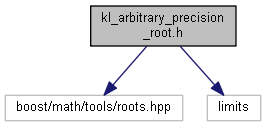#include <boost/math/tools/roots.hpp>
#include <limits>
Go to the source code of this file.
|
| template<class F , class T > |
| T | boost::math::tools::newton_raphson_iterate (F f, T guess, T min, T max, int digits) |
| |
| template<class F , class T > |
| T | boost::math::tools::newton_raphson_iterate (F f, T guess, T min, T max, int digits, boost::uintmax_t &max_iter) |
| |
| template<class F , class T > |
| T | boost::math::tools::halley_iterate (F f, T guess, T min, T max, int digits) |
| |
| template<class F , class T > |
| T | boost::math::tools::halley_iterate (F f, T guess, T min, T max, int digits, boost::uintmax_t &max_iter) |
| |
| template<class F , class T > |
| T | boost::math::tools::schroeder_iterate (F f, T guess, T min, T max, int digits) |
| |
| template<class F , class T > |
| T | boost::math::tools::schroeder_iterate (F f, T guess, T min, T max, int digits, boost::uintmax_t &max_iter) |
| |
| template<class T > |
| T | kl_arbitrary_precision_root (T z, unsigned int precision) |
| |
template<class T >
| T kl_arbitrary_precision_root |
( |
T |
z, |
|
|
unsigned int |
precision |
|
) |
| |
Definition at line 183 of file kl_arbitrary_precision_root.h.
References boost::math::tools::halley_iterate().
188 T min = ldexp(0.5, exp/3);
189 T max = ldexp(2.0, exp/3);
190 T guess = ldexp(1.0, exp/3);
191 int digits = std::numeric_limits<T>::digits / 2;
193 cout<<
"The typeid for this datatype is : "<<
typeid(z).name();
195 string zType =
typeid(z).name();
196 int usingArb = zType.compare(
typeid(boost::math::ntl::RR).name());
199 cout<<
"We're using arb precision"<<endl;
200 digits = precision /2;



